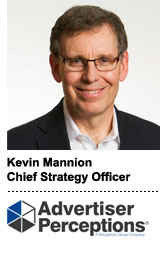 The more things change, the more things stay the same.
The more things change, the more things stay the same.
At least that’s the case for the crowded demand-side platform (DSP) category, where Google and Amazon maintain their top-dog status.
Meanwhile, independent, telco-owned and marketing cloud DSPs vie for a dwindling number of enterprise accounts, according to an Advertiser Perceptions survey of more than 700 ad buyers, split about evenly between brands and agencies.
Advertiser Perceptions added Amazon to its DSP market research over the past year and was surprised to discover the ecommerce leader had quietly become the only true rival to Google’s DoubleClick Bid Manager (DBM) in terms of marketer adoption.
That dynamic remains in place, with the Amazon Ad Platform (AAP) tying DBM at 37% agency adoption and taking a big lead with direct brand deals, where AAP leads 44% to 35%.
One reason Amazon and Google are pulling further ahead is because “audience scale or reach” has become the decisive driver of DSP adoption, said Advertiser Perceptions CSO Kevin Mannion. Facebook also benefits from these same advantages, Mannion added, though it was not included in the survey as it doesn’t have a DSP.
“Unique, addressable audiences are something the big consumer platforms have that can’t be replicated,” he said.
DSPs owned by companies that don’t have a direct consumer connection try to differentiate with better APIs and by integrating measurement solutions to ensure safety or counter fraud. But these additions are checkbox engineering, and are largely commoditized, Mannion said.
And tech firms without consumer recognition struggle to communicate their value and position in the market, even after a decade of programmatic tech growth. Potential clients simply do not recognize them the way they do Amazon, Facebook and Google.
Marketers described the supply-side platform Rubicon Project, for instance, as a DSP as often as they did AppNexus, DataXu or The Trade Desk. And many also considered The Trade Desk an agency trade desk due to its name, Mannion said.
And a plurality of marketers didn’t know how to categorize Criteo, Viant and agency-owned programmatic solutions like Accordant and Accuen.
“One of the things holding back broader adoption for many DSPs or agency trading desks is that marketers don’t know who they are and seem to just bundle programmatic vendors together,” Mannion said.
Another disadvantage for programmatic tech is the steady march toward in-house brand technology.
A year ago, 28% of brands surveyed by Advertiser Perceptions had taken advertising in-house and 51% where exploring the idea. Now 30% are exploring and 32% have already brought advertising in-house.
But there’s an optimistic angle to the increased in-housing, since most of the marketers who considered it continue outsourcing to agencies and tech companies.
Also, programmatic vendors benefit from this trend when agencies white label their tech, Mannion said. Programmatic vendors work in the background while the agency reports to the brand – clearing the brand’s account roster without consolidating the industry as much as an observer might expect when reading top-line in-housing rates.
But those are still just silver linings in the storm clouds hanging over the DSP industry.
The Trade Desk, for instance, was the only DSP that didn’t lose ground since last year among the agencies surveyed by Advertiser Perceptions – and its agency adoption rate remained flat.
The average number of DSPs employed by a marketer also ticked down from 3.1 to 2.9, not a big drop but a potentially momentous shift if agencies and brands decide to work with fewer than three ad platforms.
AAP and DBM have increased their share of the market, lead among marketers considering new DSPs and are the top two by far when marketers are asked which DSP they most prefer, which indicates brands and agencies aren’t cutting out Amazon or Google even as they trim their DSPs, slowly, to three or fewer.
“Most marketers still have a seat for a non-walled-garden DSP or even work with one or more without knowing it through an agency,” Mannion said. “But adding one more Goliath has not been great for the Davids among DSPs.”











